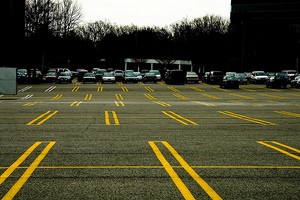 There are a couple of ways to tackle the problem of polluted runoff: keep the water from getting fouled in the first place, or clean it up once it’s contaminated. It doesn’t take a hydrology expert to figure out that in many cases, it’s cheaper and easier to deal with a pollutant at its source before it’s dissolved in water and spread far and wide.
There are a couple of ways to tackle the problem of polluted runoff: keep the water from getting fouled in the first place, or clean it up once it’s contaminated. It doesn’t take a hydrology expert to figure out that in many cases, it’s cheaper and easier to deal with a pollutant at its source before it’s dissolved in water and spread far and wide.
So goes the logic behind HB 1721, a bill proposed in Olympia that would ban the sale and application of coal-tar pavement sealants beginning next year. The sealants are applied to parking lots and driveways to make the asphalt longer lasting and give it a rich, black appearance. Trouble is, it doesn’t stay put. Like the paint on the side of your house, over time the sealant crumbles and peels off. When the rain hits the driveway or parking lot, it sponges up the bits of sealant and carries it away with the stormwater, depositing it into streams, rivers, lakes, and bays.
As you might expect from something called coal-tar pavement sealant, the product contains some nasty stuff. It has super high levels of polycyclic aromatic hydrocarbons, or PAHs, several of which are considered likely to cause cancer in people and can cause mutations or even kill tadpoles, herring, and other wildlife.
A study by the US Geologic Survey released in December found that in numerous lakes across the nation, the majority of PAHs polluting the waterbodies came from coal-tar sealants. Mud taken from Lake Ballinger in Mountlake Terrace, Wash., measured PAHs at 16.61 parts per million, with 11.83 ppm coming from the sealant. (The USGS reports harmful effects on wildlife and plants at 22.8 ppm.)
And the good news? There’s a lower-PAH alternative already in wide use.
In Western states, the most commonly used sealant is asphalt-based, while the coal-tar version is more prevalent in the central, southern, and eastern US. But the coal-tar sealant is readily available online nationwide (though it is banned in some places), and the USGS research shows it’s certainly in use in Washington. The coal tar used to make the sealant is a waste product from steel manufacturing, explains Robert McClure in an msnbc story on the pollutant.
When you line up the coal-tar sealant versus the asphalt-based product, the former has PAH levels up to 1,000 times higher than the latter.
So we’ve got a dangerous product that’s contaminating stormwater and Northwest waterways with toxic compounds, and there’s a safer alternative available. What’s a lawmaker to do?!
Hopefully they’ll follow an example set last year when many of the same Washington legislators banned the use of copper brake pads in cars and trucks (California approved a similar ban later in the year). Again, in an effort to cleanup poisoned stormwater, the leaders targeted a prime source of toxic copper in the environment and are requiring manufacturers to switch to safer alternatives.
A hearing on the coal-tar sealant legislation, whose prime sponsor is Rep. David Frockt, D-Seattle, is scheduled for Feb. 8 at 1:30 pm in Olympia.
Parking lot photo from Flickr user jgrimm used under the Creative Commons license.

Comments are closed.